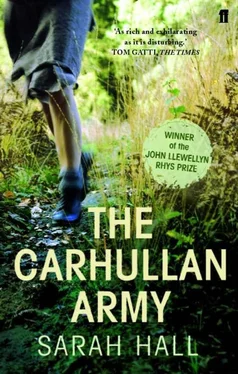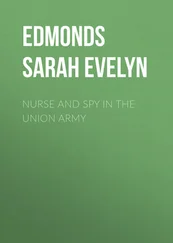Sarah Hall - The Carhullan Army
Здесь есть возможность читать онлайн «Sarah Hall - The Carhullan Army» весь текст электронной книги совершенно бесплатно (целиком полную версию без сокращений). В некоторых случаях можно слушать аудио, скачать через торрент в формате fb2 и присутствует краткое содержание. Год выпуска: 2008, Издательство: Faber and Faber, Жанр: Современная проза, на английском языке. Описание произведения, (предисловие) а так же отзывы посетителей доступны на портале библиотеки ЛибКат.
- Название:The Carhullan Army
- Автор:
- Издательство:Faber and Faber
- Жанр:
- Год:2008
- ISBN:нет данных
- Рейтинг книги:4 / 5. Голосов: 1
-
Избранное:Добавить в избранное
- Отзывы:
-
Ваша оценка:
- 80
- 1
- 2
- 3
- 4
- 5
The Carhullan Army: краткое содержание, описание и аннотация
Предлагаем к чтению аннотацию, описание, краткое содержание или предисловие (зависит от того, что написал сам автор книги «The Carhullan Army»). Если вы не нашли необходимую информацию о книге — напишите в комментариях, мы постараемся отыскать её.
The Carhullan Army — читать онлайн бесплатно полную книгу (весь текст) целиком
Ниже представлен текст книги, разбитый по страницам. Система сохранения места последней прочитанной страницы, позволяет с удобством читать онлайн бесплатно книгу «The Carhullan Army», без необходимости каждый раз заново искать на чём Вы остановились. Поставьте закладку, и сможете в любой момент перейти на страницу, на которой закончили чтение.
Интервал:
Закладка:
The container of water had been placed at my feet, before the door was closed and barred. When I reached to pick it up my head grazed against the rusty corrugation and I had to crane my neck to the side and put my hand on the wall to guard against the patches of sharply torn metal. It was the first fluid I had had for hours. I unscrewed the lid, upended it and drank thirstily, taking down great gulps of liquid until I choked. It was too much. My stomach heaved and I brought it all up in a bitter wash that spilled over my chin and down my clothes. For all my thirst, I knew I had to moderate my intake, making sure only to have small resting sips. After each drink I shook the bottle and tried to estimate how much water was left, how long it would last. No food was brought.
Every hour the containment became worse. I suffered cramp and had to move position constantly, rubbing my legs to try to stop them shaking. The muscle spasms in my thighs and calves felt uncontrollable. I had taken my legs to the point of convulsion after the long walk; they were starved of protein and the space to recover. My back ached from its carried load and the strain of being kept vertical after such exertion, from being bent and contorted as I tried to sleep leaning against the corners of the enclosure. I was desperate to sleep, and could not. The cell would not allow it. I tried curling in a ball around the stool, with my face on my hand, but the ground was damp and filthy; it reeked of piss and shit. I didn’t know if it was animal or human. I was terrified that it was from other hostages, others who had come here. I tried not to believe it, I told myself there had not been people in here, kept like this for whatever terrible reason, but deep down I knew that there must have been.
A few hours after I began to drink the water I felt the urge to urinate. I banged on the iron walls and called for someone to come and let me out, but it was futile. No one responded. No one even denied the request. Outside there was no sound, just the oboe of wind through the grass, and the strange nocturnal pitch of the moorland. After another hour my bladder began to burn and feel distended and I knew there was no other option but to relieve myself in the narrow space. I undid my trousers and crouched as best I could. Holding the water container on the seat of the stool, I tried to open my legs and squat back, but I began to shake violently again and the hot stream ran down my ankles. It happened every time I tried to piss. Finally, towards the end, I did not attempt to keep myself dry and clean. I let the neck of my bladder release while I was sitting on the stool and urine soaked over the wooden slat, down the legs of my trousers and onto the ground.
In the constant darkness I became confused about where I was. At times the room seemed bigger, wider. At times I felt that I could stand up and walk over to the other side, with my arms outstretched, or that I could even run the length of it, as if I were in a wide marble palace. I woke and thought I was back in the terrace quarter and I reached for the Mag-lamp next to the bed, only to cut a gash in my knuckles. Each time I came out of my reverie banging my hands or head against iron, the air forced from my chest as the walls rushed in.
I woke to the assurance of my blindness and hunger. In the pitched void images began to flicker. I saw faces I knew and did not know, visions of murder and rape. There were maggots multiplying in the wounds I had sustained. I tried to pick them out only find myself tearing at pieces of my own skin. I had never been claustrophobic in Rith’s over-populated tenements, or as I crawled into the dead hubs of the turbines in the factory. But in the rancid air and relentless black of the dog box I felt hysteria boiling through me.
In the bouts of ragged sleep my bearings failed. I dreamt that my coffin was being buried in the peat gullies on the bields where I had lain face down, tasting the hag, my hands fastened behind my back. I dreamt that I was crawling through underground tunnels, pulling at cords of roots, only to have the soil cave in on top of me, filling my mouth and ears, the holes where my eyes had been. And I dreamt I was in the mouth of an iron woman. Her teeth were closed around me, and she was carrying me back to her den of wrecked metal in the mountains. I heard the creaking of her legs as she strode, like panels of metal beating in the wind.
I called out for someone to come, for someone to help me, please. When they pushed me inside I had not struggled, only tried to explain myself to the two women. I’d told them I had come because I believed in them. Because of how I felt inside. Because there was a coil in me, fury in me; something clawing to get out. I had come because what was left of the country was the disfigurement of its sickness, the defects left by its disease, and I would not let it infect me.
In the hours that passed I tried to find better, more accurate words to tell them why I had come, and who I was, who I wanted to be. I babbled to whomever I thought was waiting outside the narrow corrugated door. I pleaded with them, begged for their trust. I refused their silence, their abandonment, dreading to think I had been forgotten and left to die. There had been a mistake, I said. There had been a misunderstanding. I was here because I was like them. I asked forgiveness for not coming sooner. I battered the sides of the enclosure until I could smell my own blood turned loose over my arms, its scent like lead.
It was not torture. It was not torture because there was no one hurting me, no one peeling away my nails and salting the pulp beneath. The only presence in the iron box was my own. I began to understand that I owned the abuse; I was the only persecutor. They were not killing me slowly, methodically, with scalding instruments and wires. They were letting me break apart, so I could use the blunt edges of reason to stave in my mind, and the jagged ones to lance open the last blisters of sanity. I thought at times I might still have been lying on the fell, my skull cracked open on a lichen-pale rock as the deer raced past. I thought I must be dreaming all this up, waiting to be found. Then I thought of nothing.
There was the smell of fresh food. On the ground there was a warm heap of something. I had put it into my mouth before I realised it was shit.
I heard Andrew’s laughter outside. I heard him knocking on the side of the enclosure, saying there was a letter for me waiting at home. The evening lottery had selected my number for reproduction. We could try and conceive now if I still wanted a baby. My mother walked towards me holding a lit taper. Both her breasts were missing and there were pegs along the mastectomy scars, holding the incisions closed. It was not the woman in the photographs I had been given when I was five years old, but the woman who had put her fingers in my mouth, testing to see how long I could withstand this place. She reached between my legs and brought out the decayed dog I’d seen in my father’s garden. I held it in my arms and it felt like a piece of wet leather.
In the end I knew that if they left me much longer, I would not survive all the deaths of myself that it was possible for me to create.
FILE THREE: COMPLETE RECOVERY
She woke me by putting a hand on my forehead. I was lying on my back, finally able to unhook my joints and extend my body. The first sensation was feeling unfastened, so slack and comfortable that I could almost not come round, and if the hand had not stayed where it was, exerting gentle pressure, I would have drawn the soft layers of unconsciousness over myself again and fallen away. But she did not want that. She spoke a word and then a number and I reached towards them, half recognising them, but they slipped away.
I did not know how I had kicked away the iron walls and freed up enough space to straighten my legs and uncurl my back. My thoughts were slow to arrive and difficult to arrange. If the door of the dog box was open I could escape. If the pen was like a puzzle, somehow I had decoded it, made one sprung move, one solving turn, and the sides of the cage had released. I could sleep. The stool was gone and I was lying in the dirt. And yet it was smooth and there was the fragrance of soap.
Читать дальшеИнтервал:
Закладка:
Похожие книги на «The Carhullan Army»
Представляем Вашему вниманию похожие книги на «The Carhullan Army» списком для выбора. Мы отобрали схожую по названию и смыслу литературу в надежде предоставить читателям больше вариантов отыскать новые, интересные, ещё непрочитанные произведения.
Обсуждение, отзывы о книге «The Carhullan Army» и просто собственные мнения читателей. Оставьте ваши комментарии, напишите, что Вы думаете о произведении, его смысле или главных героях. Укажите что конкретно понравилось, а что нет, и почему Вы так считаете.












